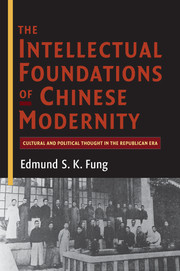 The Intellectual Foundations of Chinese Modernity
The Intellectual Foundations of Chinese Modernity Published online by Cambridge University Press: 03 May 2010
This chapter sets out to explore modern Chinese liberal thought on the premise that liberalism is the political doctrine of modernity. It is fitting to begin with a reference to Jerome Grieder's seminal work on Hu Shi in which the author draws a distinction between liberalism in China and Chinese liberalism:
Liberalism in China…meant much the same thing that liberalism has meant elsewhere: a belief in popularly based institutions of government, in the rule of law, in political processes that are made legitimate by the manner in which they function rather than by the ends ascribed to them; and, uniting all these elements, a belief in the creative and benign power of free intelligence. Liberalism in China remained, in the context of Chinese conditions, essentially an abstraction.
On the other hand, ‘Chinese liberalism meant something more concrete in the Chinese mind: a pattern of personal values reminiscent of the values of the Confucian “superior man,” an ideal that had existed virtually unchanged through the long centuries of imperial history.’ Grieder's point is that the Confucian tradition profoundly influenced Chinese liberal thought. The distinction he draws helps me to frame two questions for investigation in this chapter. First, how did Republican Chinese intellectuals understand liberalism? Second, what were the features and specific concerns of their liberal thought? In answering these questions, I will also attempt, at the end of the chapter, to shed light on the relationship of liberal thought to cultural radicalism and to conservative thought.
To save this book to your Kindle, first ensure no-reply@cambridge.org is added to your Approved Personal Document E-mail List under your Personal Document Settings on the Manage Your Content and Devices page of your Amazon account. Then enter the ‘name’ part of your Kindle email address below. Find out more about saving to your Kindle.
Note you can select to save to either the @free.kindle.com or @kindle.com variations. ‘@free.kindle.com’ emails are free but can only be saved to your device when it is connected to wi-fi. ‘@kindle.com’ emails can be delivered even when you are not connected to wi-fi, but note that service fees apply.
Find out more about the Kindle Personal Document Service.
To save content items to your account, please confirm that you agree to abide by our usage policies. If this is the first time you use this feature, you will be asked to authorise Cambridge Core to connect with your account. Find out more about saving content to Dropbox.
To save content items to your account, please confirm that you agree to abide by our usage policies. If this is the first time you use this feature, you will be asked to authorise Cambridge Core to connect with your account. Find out more about saving content to Google Drive.